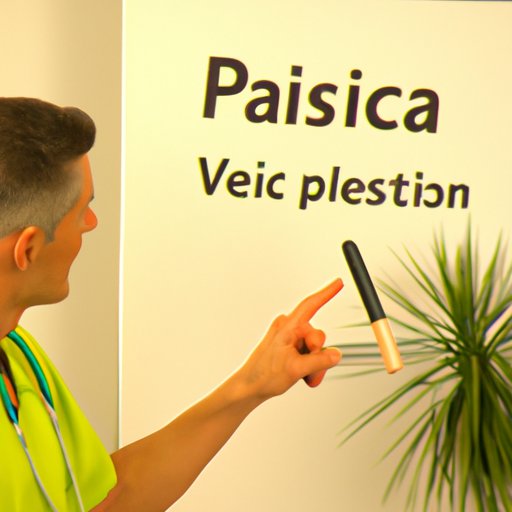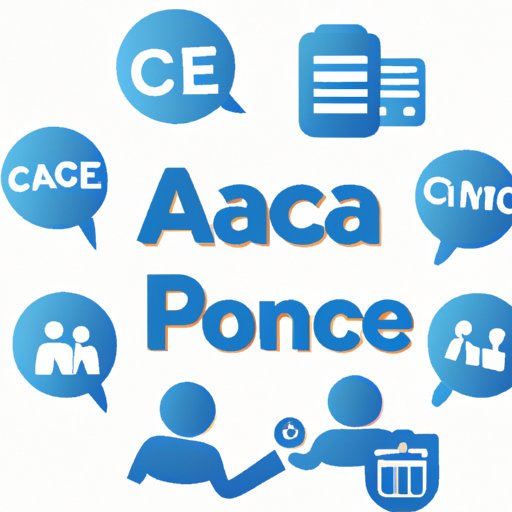Introduction
Personal Care Assistants (PCAs) are increasingly becoming an invaluable part of home care for seniors. PCAs provide an array of services that enable seniors to remain independent and comfortable in their own homes. In this article, we will explore what PCA in home care is and how it can benefit seniors who need assistance with daily activities.

Explaining the Basics of PCA in Home Care
PCA in home care is a type of care provided by a personal care assistant who assists seniors in completing the activities of daily living. The goal of PCA in home care is to help seniors maintain their independence and quality of life while remaining safely in their own homes. PCAs provide a wide range of services, including personal care, homemaking, errands, and companionship.
Definition of PCA
A PCA is a trained individual who provides personal care and support services to seniors in their own home. The PCA’s responsibilities may include helping with bathing, dressing, grooming, and other activities of daily living. They may also assist with light housekeeping, laundry, meal preparation, and transportation. Additionally, PCAs can provide emotional support and companionship for seniors who are dealing with loneliness or social isolation.
Types of Services Provided by PCAs
PCAs can provide a variety of services depending on the needs of the senior. Some of the most common services provided by PCAs include:
- Bathing and dressing assistance
- Meal preparation and feeding assistance
- Light housekeeping
- Laundry
- Transportation
- Errands and shopping
- Medication reminders
- Companionship
How PCA Services Can Help Seniors Live Independently at Home
PCA in home care can be extremely beneficial for seniors who need extra help to remain independent at home. With the help of a PCA, seniors can continue to live in their own home and stay active in their community. Here are some of the ways that PCA services can help seniors:
Assistance with Daily Activities
PCAs can help seniors with various activities of daily living such as bathing, dressing, grooming, and toileting. They can also provide assistance with meal preparation, laundry, and light housekeeping. By providing these services, PCAs can make it easier for seniors to remain independent and comfortable in their own homes.
Emotional Support and Companionship
PCAs can also provide much-needed emotional support and companionship for seniors who may be dealing with loneliness or social isolation. PCAs can provide conversation, friendship, and support, which can be invaluable to seniors who do not have family or friends nearby. This can help seniors stay connected to their communities and feel less isolated.
The Benefits of Hiring a Professional PCA
Hiring a professional PCA is one of the best ways to ensure that your loved one receives quality care and supervision. Professional PCAs are highly trained and experienced in providing care and assistance to seniors. Here are some of the benefits of hiring a professional PCA:
Quality Care and Supervision
Professional PCAs are highly qualified and experienced in providing quality care and assistance to seniors. They are knowledgeable about the needs of seniors and have the skills and training necessary to provide safe and effective care. Additionally, they are able to properly supervise seniors to ensure their safety and well-being.
Flexibility and Availability
Professional PCAs are usually available on a flexible schedule. This means that you can arrange to have a PCA come to your home during times that are convenient for you and your loved one. This can make it easier to manage your loved one’s care needs without having to worry about scheduling conflicts.

How to Find and Choose the Right PCA for Your Needs
Finding and choosing the right PCA for your loved one’s needs can seem overwhelming. However, there are several steps you can take to ensure that you find the right PCA for your needs. Here are some tips for finding and choosing the right PCA:
Researching Potential Candidates
The first step in finding the right PCA is to research potential candidates. You can start by asking for referrals from friends and family members. You can also use online resources to search for PCAs in your area. Make sure to read reviews and check references before making a final decision.
Interviewing and Screening Process
Once you have found a few potential candidates, it is important to conduct an interview and screening process. This will give you the opportunity to ask questions and get to know the PCA better. Make sure to ask about their experience, qualifications, and availability. You should also ask for references and documentation of their qualifications.

The Costs and Insurance Coverage for PCA Services
The cost of PCA services will vary depending on the type of services needed and the amount of time required. Generally, PCA services are paid out-of-pocket, but some insurance plans may cover some or all of the cost. Here is some information about the costs and insurance coverage for PCA services:
Out-of-Pocket Expenses
Most PCA services are paid out-of-pocket. The exact cost will depend on the type of services needed and the amount of time required. For example, if you only need a PCA for a few hours a week, the cost will be lower than if you need 24-hour care. It is important to consider your budget when determining the amount of care you need.
Insurance Coverage
Some insurance plans may cover the cost of PCA services. Contact your insurance provider to determine if your plan covers PCA services and what the requirements are. Depending on your plan, you may need to meet certain medical criteria in order to qualify for coverage.
Frequently Asked Questions About PCA in Home Care
Here are some answers to frequently asked questions about PCA in home care:
What is the Difference Between PCA and Home Health Care?
The main difference between PCA and home health care is that PCA services are focused on providing assistance with activities of daily living, whereas home health care is focused on providing medical care. Home health care typically requires a doctor’s order and is covered by Medicare, whereas PCA services are usually paid for out-of-pocket and are not covered by Medicare.
What Qualifications Does a PCA Need?
A PCA should have a high school diploma or equivalent and should have completed a state-approved PCA training program. Additionally, they should have experience working with seniors and knowledge of basic first aid and CPR.
Are There Any Age or Health Restrictions for PCA Services?
There are no age or health restrictions for PCA services. However, some PCAs may specialize in providing care for certain conditions or illnesses. It is important to discuss your loved one’s specific needs with potential PCA candidates to ensure they are qualified to provide the necessary care.
Conclusion
PCA in home care can be extremely beneficial for seniors who need extra help to remain independent at home. PCAs provide assistance with activities of daily living and emotional support and companionship. Hiring a professional PCA can ensure that your loved one receives quality care and supervision. Additionally, there may be insurance coverage for PCA services, so it is important to contact your insurance provider to determine your coverage options. With the help of a PCA, seniors can continue to live in their own home and stay active in their community.
(Note: Is this article not meeting your expectations? Do you have knowledge or insights to share? Unlock new opportunities and expand your reach by joining our authors team. Click Registration to join us and share your expertise with our readers.)
